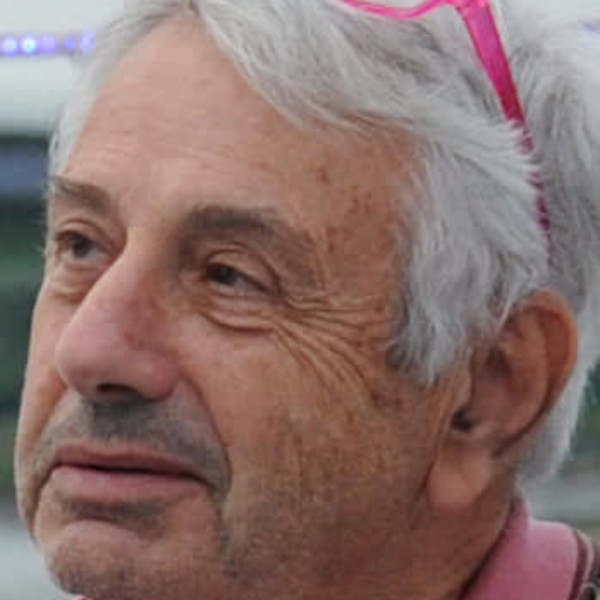Interviews with Olim
Each month, we interview an oleh or olah for our newsletter.
We invite you to read the stories of LGBTQ+ people who have made Israel their home.
"I am an archaeologist. Israel is the right place for such a profession"
Interview date: December 2019
Q. Where were you born and where did you grow up?
A. Paris, France.
Q. At what age did you come out? And how did it go?
A. At 18 to my girlfriend. Then I did not know what I wanted. I had a very nice straight start at 17, while being “interested” in guys, silently, since early childhood. Then at 27 in 1978, when I was drafted into the French army, at a military hospital as a biologist in Paris. (I had realized that the army did not care). A high school friend appeared to be into gay sex after having been “initiated” by a fellow university student, after a “boozy” party. He was my first try, but I was so tense that I did not finish and could not eat or drink the following 24 hours. He did not care to initiate me. I went regularly to “the” disco of Paris, and eventually took an apartment with a companion whom I met there, a year later! He was accepted by my parents without any question. My Mum took it with a sense of humour. My Dad never commented upon my orientation. I did not “declare” myself to my teenage friends except the closest one. He disapeared for half a year from my life, and then came back. Long digestion. We are still very close.
Q. Were you involved at all in the LGBT community back home?
A. Yes. During the first “informal” years of the French Jewish gay group “Beit Haverim”. I was writing and photocopying their journal. I created its first logo, a Star of David with a pink triangle on the lower left branch. I was brought there by a gay friend. In 1979 (I think) I attended the first International Jewish Gay Conference to take place in Israel, in Tel Aviv. The French delegation of 8 people was second only to the American one that comprised… 50 people!
Q. What is your involvement (if any) in the LGBT community in Israel?
A. None. I just attend the Gay Pride every year for the fun. I never saw myself as part of the “ghetto”, but simply a man who is attracted to men, with a potential for love.
Q. How long since you made Aliyah?
A. I got my Israeli citizenship in 1990, after having been in Jerusalem for five years with a French research grant in archaeology, to write the theses of my BA, MA and PhD degrees. I was a temporary resident for three years and I kept my French citizenship.
Q. Did you move here on your own or with family/friends/significant other?
A. I actually stayed, and did not make a formal aliya from France. I submitted the papers at the Jerusalem branch of the Jewish Agency. My closest gay friend at that time was relocated from the French National Center for Scientific Research in mathematics to Bar Ilan University the same year I got my first grant. He eventually made aliya too, but died as an AIDS “second generation” victim (i.e. despite tri-therapy) in 1991. Our time in Israel for five years was great, better than if I had come alone. I miss him a lot.
Q. Why did you make Aliyah?
A. I wanted to continue my research in archaeology after my PhD and eventually got a full time job. I never intended to live in Israel (I knew the cultural “difficulties” through friends who did aliyah before me). But I was too old to get an academic position in France or in Quebec where I applied (archaeology is my second profession).
Q. How is it going so far?
A. On the personal side, I had an Israeli companion in the early years, a room-mate, when I was writing my MA thesis, but that did not last. Otherwise nothing serious. I lived in Jerusalem the 25 first years (with many weekends in Tel Aviv), not exactly the best place for gays then. It got better when I moved to Netanya… at 61! But no emotional encounters, since I met my sex mates through Atraf. Not the way to find easily a companion, it at all.
Q. What do you do in terms of work?
A. I am an archaeologist. Israel is the right place for such a profession. My job is great and it is my best achievement here. I just retired from a senior archaeologist position, involving the direction of large and some smaller rescue excavations (e.g. before building the Carmel road interchange and tunnel, in Haifa).
Q. How is your Ivrit?
A. Speaking, good enough to teach 10 years at the Haifa University as an external lecturer. Understanding, very good. Reading and writing, only administrative papers and bills. I was publishing my excavation reports in English, and lectured in English and French at conferences.
Q. What has been your biggest challenge so far?
A. Positive one: being internationally recognized in a specific field in Ancient History. Negative one: impossibility to cope with the Israeli system and society. I know that there is obviously someone out there who may be a good companion. But we have to meet like molecules to create a positive energy. And there are many diverse, attractive guys in Israel. Love is great, but often not enough to make a couple. I am very open minded and love to share my positive perception of the world. But also to get to know new people, different than myself. That is why I feel good here in the end.
Q. How do you perceive the Israeli LGBT community?
A. As a man, of course too sexualy oriented (I know only Atraf, and it is horrible for those who seek a relationship). But I see many gay couples and parents. That is due to a strong sense of family and community in Israeli society.
Q. How is being LGBT in Israel different to back home?
A. Much cooler in Israel than in France. Not taking into account the closet, overcrowded with religous people of all kinds. In my time in Paris, it was nice. The freshness of the breeze of recent freedom!
Q. If you were making aliyah now, would you do anything differently?
A. Everything, as far as my reactions to Israeli society and culture are concerned. I should have spent more energy to be involved with a small group of friends and acquaintances with similar interests and feelings. That would have helped me to cope with the rest of the different Jews. Concentrate more on what unites us all: being Jews on (most of) our land. I am in the process of knowing better my family past and that of the making of Israel during the Mandate. Despite the horrors, we are alive and we intensely live.
Gerald

Our Newsletter
Sign up if you would like to receive a monthly email listing events of interest to LGBT English-speakers in Israel, an interview with an oleh/olah and other useful information.
Want to be interviewed?
Complete the form below and we will get back to you.
Our Newsletter
Sign up if you would like to receive a monthly email listing events of interest to LGBT English-speakers in Israel, an interview with an oleh/olah and other useful information.
Want to be interviewed?
Complete the form below and we will get back to you.



